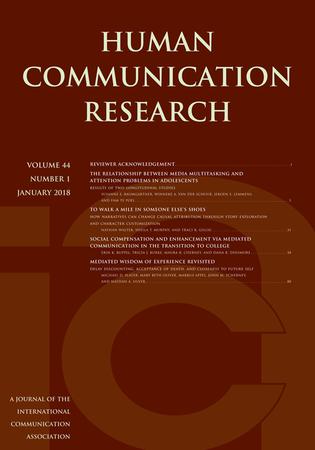成功的秘诀:二元通信和合作游戏对后续非游戏任务性能的影响
IF 4.4
1区 文学
Q1 COMMUNICATION
引用次数: 2
摘要
合作游戏与越来越多的亲社会利益联系在一起。然而,很少有研究考察其组成部分,以确定它们对随后的积极结果的贡献。目前的研究将合作伙伴的沟通视为合作游戏的一个共同甚至必不可少的方面,这可能在很大程度上解释了它对合作行为和有效团队合作的积极影响。在参与两个需要有效沟通才能成功完成的谜题解决任务之前,参与者可以单独或与同伴一起玩合作游戏(《Overcooked 2》),后者有或没有沟通能力。研究结果表明,沟通是不必要的,甚至可能不利于团队在非游戏任务中的后续表现,这似乎不太可能解释合作游戏积极效应背后的理论机制——合作规范。结语部分讨论了理论意义和未来的研究方向。本文章由计算机程序翻译,如有差异,请以英文原文为准。
A Recipe for Success: The Effect of Dyadic Communication and Cooperative Gameplay on Subsequent Non-gaming Task Performance
Cooperative game play has been associated with a growing list of prosocial benefits. However, less research has examined its constituent parts to determine their contribution to subsequent positive outcomes. The current study examined partners’ communication as a common and even imperative aspect of cooperative play that may largely account for its positive effects on cooperative behaviors and effective teamwork. Partners played a cooperative game (Overcooked 2) alone or with a partner, and in the latter case with or without the ability to communicate, before engaging in two puzzle-solving tasks that required effective and efficient communication for successful performances. Results suggest communication is unnecessary, and may even be detrimental to, subsequent team performances on non-gaming tasks, and that it seems unlikely to account for the cooperative norms proposed to be the theoretical mechanism behind cooperative play’s positive effects. The conclusion discusses theoretical implications and potential future research.
求助全文
通过发布文献求助,成功后即可免费获取论文全文。
去求助
来源期刊

Human Communication Research
COMMUNICATION-
CiteScore
8.20
自引率
2.00%
发文量
28
期刊介绍:
Human Communication Research is one of the official journals of the prestigious International Communication Association and concentrates on presenting the best empirical work in the area of human communication. It is a top-ranked communication studies journal and one of the top ten journals in the field of human communication. Major topic areas for the journal include language and social interaction, nonverbal communication, interpersonal communication, organizational communication and new technologies, mass communication, health communication, intercultural communication, and developmental issues in communication.
 求助内容:
求助内容: 应助结果提醒方式:
应助结果提醒方式:


